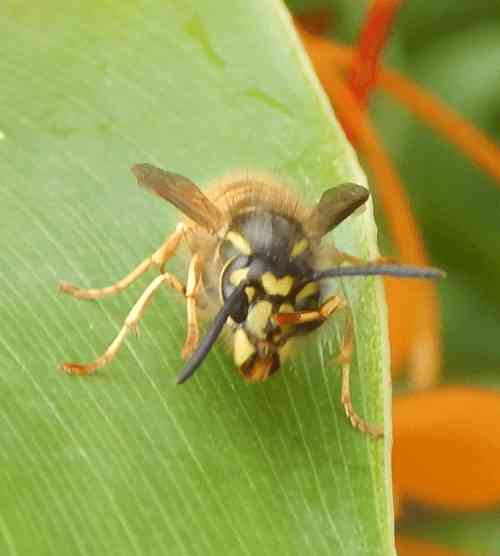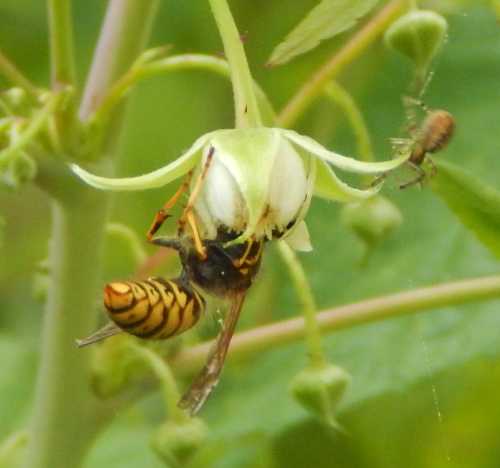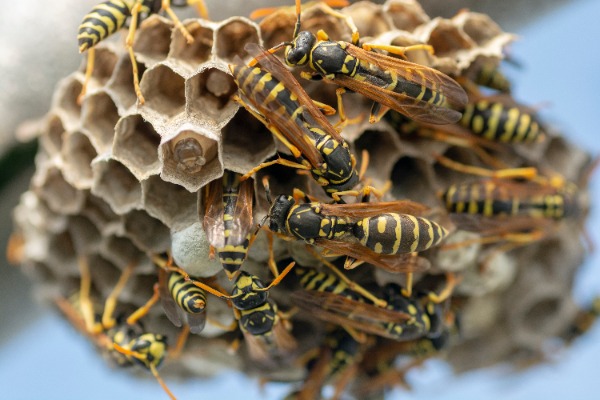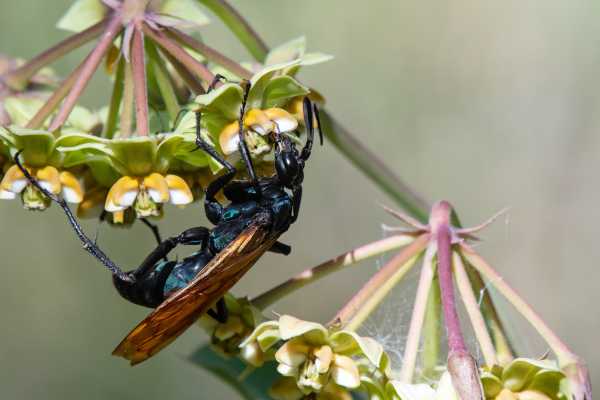Wasp FAQS
20 Frequently Asked Questions About Wasps
Below are a number of FAQs about wasps. Please note the answers mostly will relate to our most common species.
20 FAQS About Wasps
 Wasp grooming.
Wasp grooming.
1. Are bees related to wasps? What’s the connection between wasps and bees?
Both bees and wasps belong to the insect order, hymenoptera.
Bees are believed to be descended from wasps (entomologists state that bees are in fact, a type of hairy wasp!), Some species of bee could easily be mistaken for wasps. Please see: Are bees and wasps related?
2. What is the point of wasps?
This has to be one of the most frequently asked questions about wasps.
Quite simply, wasps are helpful pollinators, they control ‘crop pests’ (from pest cockroaches to crop pests) and nests of some social species may provide homes for other beneficial insects. See Are Wasps Beneficial?
3. What's the difference between bees and wasps?
See my page about Bees, Wasps & Hornets.
The main difference is that wasps feed 'meat', in the form of other insects - especially larvae, to their offspring. Most bees feed their offspring pollen and nectar (although there are exceptions).
4. Do wasps make honey?
A small group of wasps found in South America, are known to make honey. You can read about them and watch a video on my page: Do Wasps Make Honey?
5. Which wasp has the most painful sting?
In a study comparing the sting pain of 96 insects, the most painful sting came from the tarantula hawk wasp, yet its sting was also the least venomous!
Read more about bee, wasp and hornet stings.
6. Do wasps pollinate flowers and crops?
Yes, and some plants are known to be reliant on certain species of wasp for pollination - such as the fig wasp. Wasps have a hairy thorax and abdomen, meaning that they can inadvertently transfer pollen from one flower to another.
You can read some of the research about wasp pollination.
 Wasp pollinating raspberry flowers.
Wasp pollinating raspberry flowers.7. Are bees better than wasps?
Both are valuable in different ways. See my page in which I address this question: Are Bees Better Than Wasps?
8. Where do wasps build nests?
It depends on the type of wasp. However, there is great variety between species.
Some wasp species use mud, others hollow plants stems. Gall wasps induce a 'gall' to develop, particularly on tree branches and leaves, thereby effectively leaving the plant to do the work of protecting the wasp's developing offspring.
Fig wasps complete their lifecycles inside fig fruits.
Other species, the cleptoparasites, do not build nests, but instead, use a living host, such as a caterpillar, in which the wasp young are born.
However, among the wasp species most people are familiar with (including the yellowjackets), nests may be found hanging from structures such as a branch or fascia of a building, or they may be in the ground or suitable nest in compost bins or other cavities. See these examples of wasp nests.
These nests are genuinely fantastic structures. A large colony of social wasps can produce a nest as complex and amazing as the combs produced by honey bees! See my page comparing social wasp nests and bee hives.

9. What is the difference between a wasp and 'yellowjackets'?
The term 'yellowjacket' simply refers to wasps belonging to two specific wasp genera. See my page: Wasps And Yellowjackets.
10. Do wasps swarm?
There are tropical species of wasps known to swarm.
See my page about swarming wasps.
11. How long do wasps live?
Again it depends on the species.
Some have an annual lifecycle. Newly emerged queens hibernate over winter to emerge and establish new colonies the following year, you could estimate that a queen might live for as long as 12 months. Worker wasps live 12 -22 days, and the males have slightly shorter lives.
The lifespan of a wasp will of course depend on other factors, such as presence of predators etc. See: Wasp lifecycle. Some colonies can live for longer than a year.
12. Do wasps attack or kill bees?
Much of the time, you will see wasps and bees foraging close together
- I see this every year on my raspberries. However, it is a fact that some species of wasp will hunt other insects to feed their larvae, and that includes bees.
Similarly, wasps may sometimes venture into bee nests and take larvae for their young. A wasp may succeed in this task, but its success will depend on a number of factors, see do wasps attack bees?
If this is a distressing thought, it must be remembered that wasps too, have their survival problems. Humans kill animals for meat and eat non-free range. Humans will also kill for sport. Humans indirectly harm bees and birds by destroying their habitat and using insecticides.
The point that I am making here is that in nature, species commonly come into conflict for survival and food.
If humans take actions to help bees and reverse human inflicted decline on bee populations, this is where the significant positive difference will be made - and seen.
13. Where do wasps go in winter? Where do wasps hibernate?
In social, aerial nesting wasp species, commonly the whole colony will die, and only the queens will hibernate or overwinter somewhere sheltered. There may be some differences in various parts of the world and depending on species where perennial colonies are a possibility.
Single queens may find protected shelter in a variety of places, from crevices in walls and trees, to a sheltered spot in the roof of the garden shed. We have found sleepy common wasp queens in the attic of our house. Read about the life cycle of wasps.
14. How can I remove wasps without killing them?
You'll find some advice on removing wasps without killing them.
15. If wasps are good for natural pest control, why aren't farmers using them?
They are - this process is in development, but it is taking time. Read about farming and wasps.
16. Which wasp sting hurts the most? Do wasp stings hurt more than bee stings?
See my page: bee vs wasp vs hornet stings.
17. Which wasp is the most docile?
See my page which wasp is the most docile?
18. What will happen if I kill a wasp?
You will probably attract more of them! If you are genuinely afraid of wasps, it is better to repel wasps.
19. What is the difference between wasps and hornets?
Hornets are part of the wasp family, but they are of course larger than the smaller, more ubiquitous species such as the German wasp. Read more about wasps and hornets.
20. Which trees attract wasps?
Whether or not a tree will attract wasps will partly depend on the stage of the wasp colony and the range of plants and trees available upon which the wasps can forage. I have seen wasps foraging on cotoneaster flowers.
Soft fruits such as plums may attract wasps especially later in the summer, as they may wish to feed on the sweet, ripe fruit.
If you wish to distract them away from seating areas, choose a place in your garden safely away from the home/patio/seating areas, and try leaving banana skins and discarded fruit and apple cores in that place.
Wear a pair of thick gloves, and pick up or sweep away soft fruit and wind falls at night (wear protective clothing, just in case!). Move them to the back of the garden, out of the way.
If you found this page helpful or interesting, I'd really be grateful if you would share it with others - if not this page, perhaps another, such as Gardening For Bees.
Thank you so much :) .
